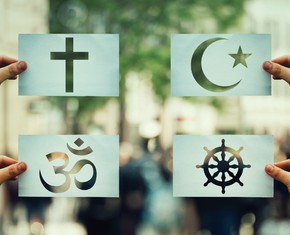The views expressed in our content reflect individual perspectives and do not represent the authoritative views of the Baha'i Faith.
In a fascinating discussion about religion, my friend Don, a retired Methodist minister, asked “What’s the main difference between Unitarians and Baha’is?”
The four of us—my wife Teresa, who is a Baha’i; Don, who is a Methodist, both personally and professionally; Don’s wife Peggy, who has attended Quaker services for many years; and me, also a Baha’i—ran into each other on Valentine’s day, sat down for dinner together, and started an intense and illuminating conversation about the differences and similarities of various religions.
Isn’t that what everyone talks about on Valentine’s Day? I know, it sounds like the beginning of a corny joke: Two Baha’is, a Methodist and a Quaker walk into a bar…
But we were serious, no bar was involved, and the four of us really enjoy talking about the dynamics of belief and sharing what we think. We’ve participated together in Interfaith activities, in various causes and charities, and in environmental groups, too. So it was fun to run into each other unexpectedly, on the day we dedicate to love in America (Only one day? What’s up with that?). On the day we celebrate love, we wound up talking about God’s love—and the outward expression of that love in the form of different Faiths.
Halfway through the conversation, we had already agreed that the Unitarians and the Baha’is had a great deal in common. Both Faiths practice love for humanity; believe that all religions have merit and validity; recommend an independent search for truth; and encourage freedom of expression and conscience. Baha’is and Unitarians both proclaim the human rights of all people, believe that science and religion have no fundamental conflict, and accept that good works, deeds and actions are the true measure of faith.
But then Don asked an important and seemingly Socratic question: “What’s the main difference between Unitarians and Baha’is?” He had a gleam in his eye, as if he already knew the answer he was looking for.
Our group struggled a little with that one. Various people at the table had differing answers. We agreed that Unitarians welcome people from all Faith traditions; but that the Baha’i teachings go even farther by proclaiming the fundamental unity of all Faith traditions. “Unitarians emerged out of liberal Christianity,” someone said, “and adopted much of their worship and beliefs from that tradition.”
That’s certainly true—Unitarians have churches, pastors and Sunday services. Baha’is have Houses of Worship where all are welcome, but the Baha’i Faith has no clergy and therefore no tradition of sermons, liturgical services or Sunday worship.
Everyone in our little group knew something about the history of the Unitarian-Universalists, although no one at the table qualified as an expert. With a little bit of quick dinner-table smartphone research, though, anyone can learn that the New England Unitarians evolved out of the Pilgrim’s original and very literal Congregational Christianity. As they evolved, some of those Congregationalists began questioning the complex and sometimes confusing idea of the Trinity—that “triune godhead” concept comprised of the Father, the Son, and Holy Ghost or Holy Spirit. Rejecting the Trinity, the old literalism of the Calvinists and the dogma of original sin, the Unitarians instead began to believe in one “unitary” God—hence their name.
In that way, we agreed, the original Unitarians strongly concurred with the Baha’i teachings:
There is one God; mankind is one; the foundations of religion are one. Let us worship Him, and give praise for all His great Prophets and Messengers who have manifested His brightness and glory. – Abdu’l-Baha, Abdu’l-Baha in London, p. 20.
The Universalists, another Christian and Protestant denomination, also rejected the old Puritan dogma of “the elect and the preterite,” the idea that God only saved a few souls, called “the elect,” and damned all the rest, called “the preterite.” That false and fanatical “hellfire and damnation” theology, the Universalists came to believe, contradicted their Christ-centered assurance of “universal salvation,” the concept that all souls would one day enter heaven. Again, that original conception agreed completely with the Baha’i ideal:
May fanaticism and religious bigotry be unknown, all humanity enter the bond of brotherhood, souls consort in perfect agreement, the nations of earth at last hoist the banner of truth, and the religions of the world enter the divine temple of oneness, for the foundations of the heavenly religions are one reality. – Abdu’l-Baha, The Promulgation of Universal Peace, pp. 95-96.
When the Unitarians and the Universalists merged their churches in 1961, I later learned, they formed the Unitarian Universalist Association, and began to incorporate a wider variety of religious traditions, going beyond their Protestant roots to welcome people from other Faiths and even people of no Faith. Many UU’s, as they’re sometimes called today, consider themselves skeptics, agnostics or even atheists. Some UU congregations have attendees who came from Jewish, Christian and Muslim backgrounds, and who now believe that religion shouldn’t separate people, but should unite them. In that sense, the Unitarian Universalists definitely see the unity of religions much like the Baha’is do:
Religion should be the cause of love and affection. Religion should unite all hearts and cause wars and disputes to vanish from the face of the earth, give birth to spirituality, and bring life and light to each heart. If religion becomes a cause of dislike, hatred and division, it were better to be without it, and to withdraw from such a religion would be a truly religious act. For it is clear that the purpose of a remedy is to cure; but if the remedy should only aggravate the complaint it had better be left alone. Any religion which is not a cause of love and unity is no religion. All the holy prophets were as doctors to the soul; they gave prescriptions for the healing of mankind; thus any remedy that causes disease does not come from the great and supreme Physician. – Abdu’l-Baha, Paris Talks, p. 130.
This commonality of all Faiths, everyone at the table agreed, reflected the true spirit of the Baha’i teachings and of many Unitarian Universalist beliefs. But we still hadn’t hit upon the answer to Don’s original question: “What’s the main difference between Unitarians and Baha’is?” Can you guess the answer? In the next essay, we’ll see if we can figure it out.
















Comments
Sign in or create an account
Continue with Googleor